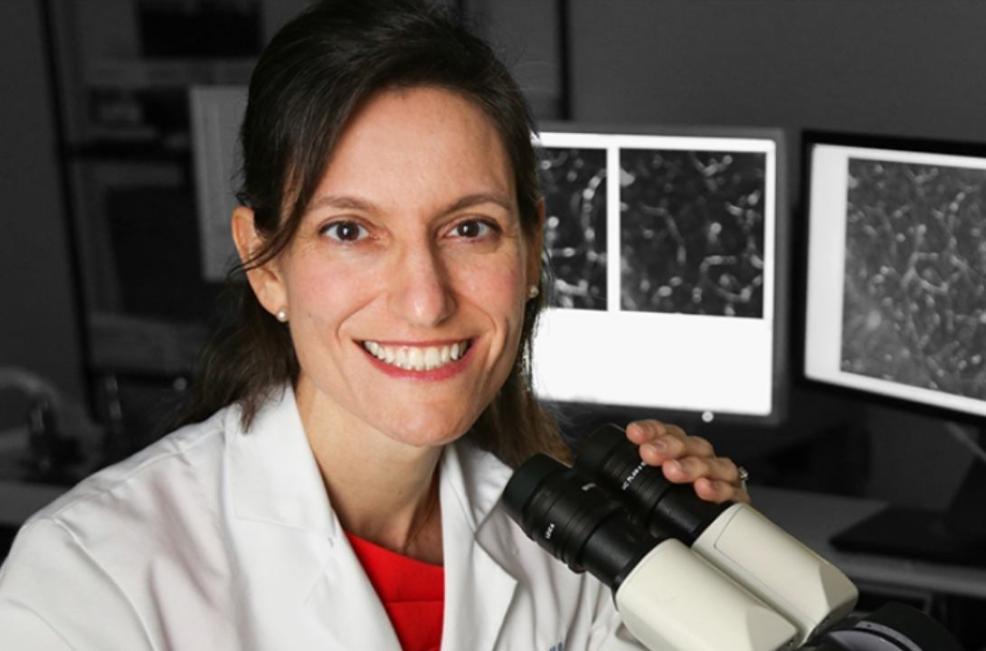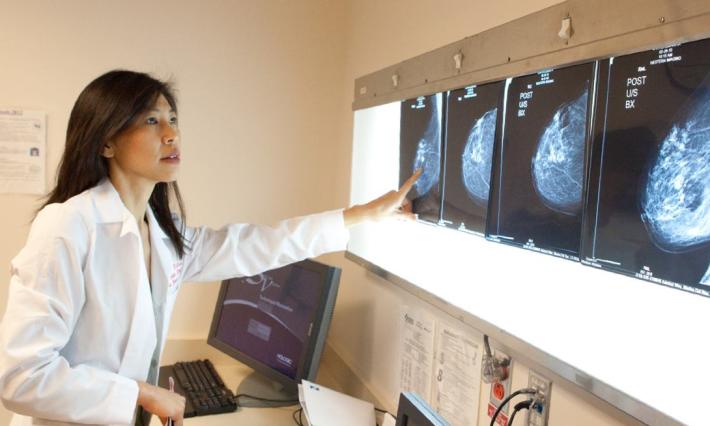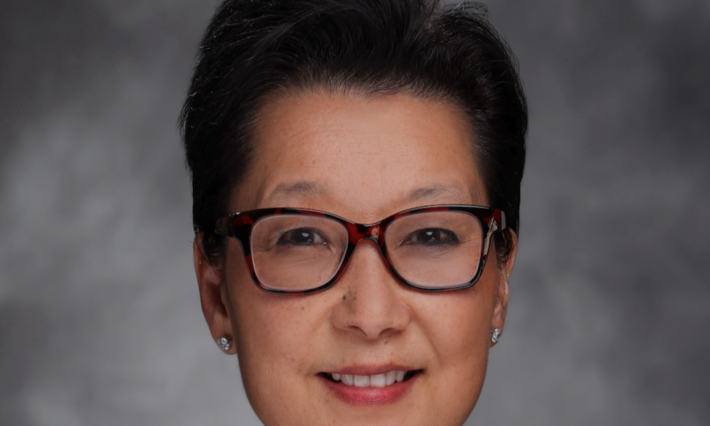There's a tradition of collaboration between Duke Cancer Institute and the American Cancer Society, which includes fundraising and raising awareness about breast cancer. There's also a decades-long history of ACS awarding grants to DCI researchers for their work to better understand the complexities of cancer and develop treatments that will deliver the best possible outcomes for patients. The month-long Making Strides campaign has now come to a close, but the research continues.

The Long Haul: DCI & ACS Partner to Make Strides Against Breast Cancer
Published
 From the Duke Cancer Institute archives. Content may be out of date.
From the Duke Cancer Institute archives. Content may be out of date.
Making Strides

For a seventh year, Duke Cancer Institute partnered with the American Cancer Society (ACS) to serve as local presenting sponsor for Making Strides of the Triangle, the charity's signature annual breast cancer fundraising and awareness raising event.
The event, virtual this year, raised more than $150,000 to help fund patient support services (including its *Road To Recovery transportation program, *patient lodging program, and 24/7 hotline), bolster *educational resources and *advocacy efforts, and boost research to improve treatments, find cures and advance preventative care and early detection.
While the traditional, large-scale in-person walk wasn't possible this year due to COVID-19 precautions, participants made strides, safely, in their neighborhoods — celebrating survivors remembering those lost, and turning miles walked or run into fundraising dollars for the local breast cancer community.
Team DCI, co-captained by Gayle DiLalla, MD, FACS (a breast surgical oncologist at Duke Women’s Cancer Care Raleigh and assistant professor in the Department of Surgery) and Jennifer Plichta, MD, MS, FACS (a breast surgical oncologist and director of the Breast Risk Assessment Clinic at Duke Cancer Institute Durham and an assistant professor in the Department of Surgery and the Department of Population Health Sciences) raised more than a thousand dollars.
This year, about 276,480 new cases of invasive breast cancer will be diagnosed in women. About 42,170 women and 520 men will die from breast cancer.
With breast cancer affecting one in 8 women in the U.S. in her lifetime and a small percentage of men (one percent of all breast cancer cases are in men), early detection is their best defense.
However, earlier this summer, the director of the National Cancer Institute predicted the number of people who will die from breast or colorectal cancer in the U.S. will increase by nearly 10,000 over the next decade because of delayed screenings, treatments and halted research caused by the pandemic.
DiLalla, who serves on the Central and Eastern North Carolina Area Board of Trustees of the American Cancer Society in addition to her DCI roles, was interviewed last week by CBS 17 as part of a segment on the Making Strides Real Men Wear Pink initiative.
DiLalla spoke in broad terms about the immunotherapy research being conducted at Duke on COVID-19 and on cancer and how the accelerated pace of this research could potentially benefit both disease areas.
In the TV interview, DiLalla also stressed the importance of keeping up with breast cancer screenings, skin cancer screenings, and colorectal cancer screenings and emphasized that cancer hasn't stopped with COVID-19.
“The rate of cancer didn’t drop with COVID. It’s still the same. And people are still being diagnosed, they still need treatment,” said DiLalla, who with Plichta and her colleagues across DCI, have continued to diagnose and care for patients during the pandemic.
Duke Cancer Institute breast surgical oncologist Lola Fayanju, MD, MA, MPHS, FACS, also spoke publicly on the pandemic’s effects on breast cancer screening.
In a “State of the State” address, held in conjunction with Making Strides, Fayanju addressed “an issue very close to her heart — addressing and promoting breast cancer care.”
“COVID-19 has had a significant impact on screening and late-stage diagnosis of breast cancer; a national study reveals an alarming decrease in breast cancer screening,” said Fayanju, an assistant professor in the Department of Surgery and in the Department of Population Health Sciences, associate director of Duke Forge and director of the Breast Clinic at the Durham VA Medical Center. “Breast cancer disparities existed before COVID-19 but it is feared that the effects of COVID-19 will exacerbate these disparities.”
Many people have lost their jobs and with that their insurance, causing them to forgo preventative care. Others may have put off their annual mammogram or delayed having a suspicious mass or pain investigated for fear of risking exposure to COVID-19. Still others may not have been able to get away to the clinic due to competing priorities at home, including having their school-age kids in the house full-time.
Fayanju closed her comprehensive talk, which included an overview of research findings, by providing information on the North Carolina Breast and Cervical Cancer Control Program that provides women low cost or free mammograms and PAP smears who are 1) uninsured or underinsured, 2) without Medicare Part B or Medicaid, 3) between age 40 and 64 (for mammograms) or between 21 and 64 (for PAP smears) and 4) have a household income at or below 250% of the federal poverty level.
Research Grants
There's a tradition of collaboration between Duke Cancer Institute and the American Cancer Society, which includes fundraising and raising awareness about breast cancer. There's also a decades-long history of ACS awarding grants to DCI researchers for their work to better understand the complexities of cancer and develop treatments that will deliver the best possible outcomes for patients.
Since 1957, Duke cancer researchers have been awarded nearly $50 million by the American Cancer Society.
The American Cancer Society is currently providing 15 Duke grantees more than $5 million in active cancer research grants and nursing scholarships with impacts across multiple cancer types, including breast cancer.

DCI Investigator: Dorothy A. Sipkins, MD, PhD
Project Funded: Targeting Dormant Breast Cancer Micro-metastases to Prevent Disease Relapse
Funding Period: 1.1.2019 through 12.31.20
Funding Amount: $238,000
In January 2020 DCI researcher Dorothy Sipkins, MD, PhD, and co-PI breast oncologist Kelly Marcom, MD, launched a proof-of-concept clinical trial of a new drug (GMI-1359) for hormone receptor positive breast cancer patients whose cancer has spread to the bone.
A team in the Sipkins Lab, led by Sipkins and senior research associate Trevor Price, PhD, had previously found that GMI-1359 successfully prevented breast cancer cells from entry into the bone marrow. The drug, discovered and invented by glycobiologist John Magnani, PhD, senior vice president and chief scientific officer at GlycoMimetics, Inc., intersects with decades of preclinical research by Sipkins, first in leukemia and then in breast cancer.
Sipkins said the trial is “the first step toward an eventual therapy that could potentially eliminate breast cancer metastasis to the bone, the most common place of breast cancer spread.”
LEARN MORE about the trial and Sipkins’ research in an article published on the DCI blog in January.
In September, the Southwest Florida American Cancer Society affiliate, representing nine counties, invited Sipkins to summarize her research project at the affiliate’s "Making Strides Halftime Show" — a virtual event geared to patients, survivors and supporters. (Find Sipkins’ presentation at the :28 minute mark.)

DCI Investigator: James Alvarez, PhD
Project Funded: Pathways Regulating Dormant Cell Survival and Recurrence
Funding Period: 1.1.19 through 12.31.22
Funding Amount: $792,000
The American Cancer Society grant has allowed the James Alvarez Lab at DCI to pursue what James Alvarez, PhD, calls an exciting new area — "namely, how dormant tumor cells rewire their epigenome in order to survive therapy and eventually recur." Alvarez is studying recurrent breast cancer in mice in order to better understand what makes a cancer cell that’s been dormant — not growing — suddenly reactivate.
Alvarez said this work may lead to new therapies that can kill dormant tumor cells and prevent tumor recurrence.
Last year, he was interviewed about his research project for a web post on the American Cancer Society’s website. READ THE POST
On Nov. 3, 2020, he and his lab colleagues revealed their latest findings in the academic journal Cell Reports. READ THE CELL REPORTS ARTICLE

DCI Investigator: Rebecca Shelby, PhD
Project Funded: A Self-Management Intervention for Women with Breast Cancer and Diabetes
Funding Period: 7.1.2016 through 12.31.2020
Funding Amount: $785,000
Rebecca Shelby, PhD, and DCI medical oncologist Gretchen Kimmick, MD, MS, launched a clinical trial in early 2018 — I HEAL — the findings of which could lead to significant improvements in clinical care and beneficial outcomes for breast cancer survivors with diabetes.
The trial was designed to evaluate the efficacy of a novel intervention they’ve designed to help breast cancer survivors with Type 2 diabetes better manage their diabetes. An estimated 20 percent of breast cancer survivors in the U.S. also have Type 2 diabetes. Shelby, the trial's principal investigator, calls this a “public health crisis.” These patients, she said, are at high risk for cancer recurrence, serious health complications, and premature death. In addition, they experience more severe, disabling symptoms and psychological distress than breast cancer survivors without diabetes.

DCI Investigator: Timothy Trotter, PhD
Mentor: Zachary C. Hartman, PhD
Project Funded: Investigating the Adaptive Immune Response to Dormant Tumor Cells
Funding Period: 04.1.20 through 03.31.22
Funding Amount: $163,500
Postdoctoral scholar Timothy Trotter was awarded the Elena Baltacha Postdoctoral Fellowship Award — initial funding for postdocs leading to a career in cancer research — from the American Cancer Society in April this year.
In an interview with Duke Surgery Communications, Trotter said his project “aims to determine if dormant tumor cells can be specifically targeted by the adaptive immune system before eventually causing metastatic recurrence.”
“This fellowship is greatly important to both the short- and long-term success of my research," he said. "It provides three years of funding for this project which allows me to pursue these clinically important questions which could lay the foundation for my career as an independent scientist.”

DCI Investigator: Scott R. Floyd, MD, PhD
Project Funded: Role of BRD4 in the Cancer Cell Replication Stress Response
Funding Period: 07.1.2019 through 06.30.2023
Funding Amount: $789,000.00
Scott Floyd, MD, PhD, published findings from his ACS-funded research into BRD4 in the September issue of Cell Reports.
He summarized the nature of this research and initial findings:
“A new weapon in the fight against cancer is a class of drugs known as ‘bromodomain inhibitors.’ Although these drugs seem to be effective against several cancer cell types in the lab, including breast cancer, it is not yet clear how well they will work for patients, and if certain types of cancers will respond better than others. This paper from my lab (The Floyd Lab) identifies a new mechanism for how these drugs are effective against cancer cells. This paper also lays the groundwork for new biomarkers that can determine whether a specific cancer will respond. We hope to use the new findings from this paper to test cancers for sensitivity to bromodomain inhibitors.”
Nursing Scholarships
Three Graduate Scholarships in Cancer Nursing Practice, each in the amount of $20,000 were awarded over the past year to Duke Nursing Students (An additional graduate nursing scholarship — for Leighanne Hartman, BS, under the mentorship of Susan Schneider, PhD, RN, AOCN, ACNS-BC, FAAN — just ended, having covered the period from 7.1.19 to 8.31.20)
- Emma Michl, BSN, under the mentorship of Mary Lou Affronti, DNP, MHSc, RN, ANP, FAAN (07.1.19 through 6.30.21)
- Jennifer Stewart, BSN, under the mentorship of Susan Schneider, PhD, RN, AOCN, ACNS-BC, FAAN (07.1.19 through 12.31.2020)
- Alessandra Lopez, BSN, under the mentorship of Susan Schneider, PhD, RN, AOCN, ACNS-BC, FAAN (7.1.20 through 6.30.22)
The newest scholarship awardee, Alessandra Lopez, BSN, works on Unit 9300, the medical oncology unit. She is pursuing an MSN — majoring in Family Nurse Practitioner in addition to pursuing an Oncology Specialty certificate — at Duke University School of Nursing.
Previous to Duke, she was at City of Hope in California, a National Cancer Institute-designated comprehensive cancer center, where she worked on a surgical oncology unit. She is an alumnus of Johns Hopkins School of Nursing where she earned her BSN.
In May she co-produced a music video with a group of DUSON students — past and present — and nurses from across the country. They sang "Lean on Me" as the COVID-19 pandemic was just getting underway.



